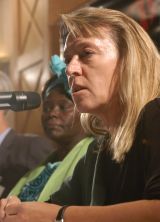Investigator rejects Sudan’s claims of bias in UN mission
March 13, 2007 (GENEVA) — Nobel laureate Jody Williams on Tuesday rejected Sudan’s claims that the UN mission she led to Darfur was biased, saying she did not lend any credence to Sudanese statements on its credibility.

“I stand totally by what we wrote.”
Williams also said the international community should “hang their heads in shame” over their response to the violence in the strife-torn western region of Sudan.
Sudan’s justice minister Mohamed Ali Al-Mardi earlier told a session of the UN Human Rights Council that the mission had a “preconceived and hostile” attitude which invalidated its accusation that Khartoum has carried out war crimes in Darfur.
The “questionable” report would damage the Council’s credibility if adopted, he warned Tuesday.
Sudan refused to grant visas to the mission, citing alleged bias amongst some of its members.
Al-Mardi told the Council: “No consideration was paid to our legitimate and objective reservations and concerns” with regard to the mission’s composition.”
“The chairperson of the mission also took, after her appointment, a preconceived and hostile attitude against Sudan,” he claimed.
Williams said Sudan had sought to criticise the integrity of the mission appointed by the 47 nations in the UN’s top human rights assembly at every step of the way, even before it was approved last December.
“We’ve been a moving target for them from the day we were announced, probably from actually before we were announced,” she said.
“I’ve been accused of being a rubber stamp for a report that was already written before I even accepted to be the head of mission. Now I’m accused of writing a hostile report because I’m retaliating because I didn’t get visas.
“With all due respect to Sudan, I’m an extremely suspicious human being and I don’t have time for their games,” Williams said.
“I accepted this mission because I believe the people of Darfur are deserving of protection and security.”
The report by the mission of experts also had harsh words for the international community’s failure to halt the violence, calling its efforts “inadequate and ineffective.”
“If people aren’t hanging their heads in shame, they should be,” the Nobel laureate and anti-landmines campaigner said.
The lack of an effective international response has been “disgusting,” she added, while “some sort of breaking point” was approaching as public opinion became more vocal, especially in the United States, she added.
The report called on the UN General Assembly to draw up a blacklist of foreign companies “that have an adverse impact on the situation of human rights in Darfur.”
Williams would not be drawn on whether she had any specific companies in mind.
But she said she hoped such a “go-for-the-money” policy by states and consumers alike could have a similar impact to the boycott of apartheid-era South Africa.
Williams praised the president of the Human Rights Council, Mexican ambassador Luis Alfonso de Alba, for “really outstanding in support of this mission.”
The report is due to be formally presented to the Human Rights Council on Friday.
Williams said she will continue to campaign on Darfur via her Nobel Women’s Committee, which she co-founded with fellow laureates Shirin Ebadi, Wangari Maathai, Rigoberta Menchu Tum, Betty Williams and Mairead Corrigan Maguire.
(AFP)
